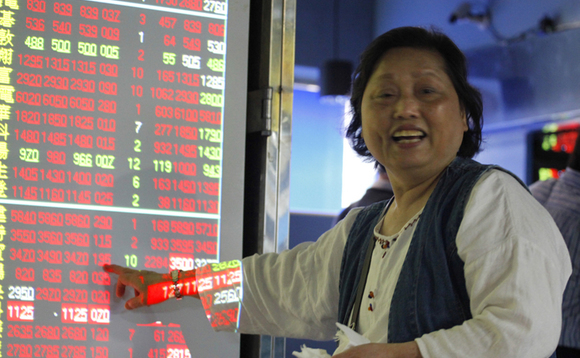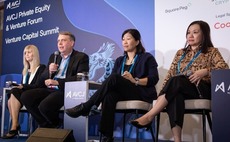
China exits: How much longer can the pre-IPO party last?

Chinese private equity funds that were drawn into the market by high public exit valuations are being given pause for thought. It represents a tipping point for Shenzhen’s ChiNext and SME Boards
One China-based fund manager captures the brute competitiveness of the pre-IPO phenomenon as follows: "We are doing a deal with you because we want you to go public in 6-18 months. If you don't go public we have the right to redeem our investment. We are basically holding a gun to your head and forcing you to run 1,000 miles per hour. If you achieve this target of going public, fine. If you don't, we will pull the trigger. Let's hope you run fast enough so that the gun doesn't point squarely at your forehead."
This polarized description is perhaps unfair to some China GPs in the growth capital space, but it reflects the intense pressure on all parties involved in such transactions.
A local fund manager accumulates a pool of capital from friends and associates on the understanding that he will double their money within as little as 12 months. The scope of investment is as limited as the horizon - they have identified one or two companies to take public and they want to do it at a high price-to-earnings (P/E) multiple.
The portfolio companies are in growth mode from the outset, spending money to boost assets and production capacity - and therefore forward valuations - with little thought to long-term strategy. An entrepreneur who fails to list might see potential millions turn into financial ruin.
This approach is largely responsible for the proliferation of renminbi-denominated private equity and venture capital funds in the last two years. Local currency funds account for 64% of the $23.7 billion raised in China so far this year, according to AVCJ Research. In 2010, their share was 75%, up from just 19% two years earlier. But how much longer can the party last?
"PE is a business of skills and experience. Some of these new funds lack both and shouldn't have been in the business in the first place, but the market offered them an opportunity. They saw how successful other funds were and followed suit," says Vincent Huang, a partner at Pantheon responsible for the China fund-of-funds business. "The short-term mentality creates volatility. A lot of these GPs don't have real value to add and so they won't be in the market for the long run."
Tough time for IPOs
Listings in Hong Kong have dried up in recent weeks, reflecting the economic concerns occupying most of the developed world. As global IPO activity dropped sharply in the third quarter, the amount of capital raised falling 57% on the previous three months, China remained comparatively robust. The Shenzhen Stock Exchange, driven by the SME Board and ChiNext, retained its position as the world's leading bourse, raising $5.5 billion from 56 deals, according to Ernst & Young.
Deal flow is slowing - data from Thomson Reuters show that market activity has dwindled markedly since the end of last year, when ChiNext saw 19 firms raise a collective $2.5 billion in December alone - but it isn't expect to grind to a halt. Valuations have dropped sharply, though. The average P/E ratio for ChiNext-listed companies peaked at 127 in late 2009, but now stands at just over 40. The SME Board has followed a similar trajectory, slipping from 59 in December 2010 to 33 today.
"It goes back to how disciplined the managers are in getting good entry valuations and helping companies to grow before listing," says Alice Chow, managing director at Squadron Capital. "A lot of PE firms are banking on exiting quickly at high exit multiples and they are paying a lot of get in. But the exit timing may have to change."
It is generally agreed that many of these private equity firms won't succeed in raising new funds. However, it will take time for them to disappear as LPs must stick with a fund for the duration of its investment cycle. Rough comparisons can be drawn with the bursting of the Silicon Valley bubble where it took 2-3 years for the market to re-orient itself.
The impact might first be felt by portfolio companies if the capital markets continue to slow. Should a firm fall short of the targets agreed with a private equity backer - failing to list or failing to meet the valuation level needed to generate a sufficient return - it might be obliged to buyout the investor.
The ratchet mechanisms used by Chinese private equity firms are simpler than the offshore structures employed by hedge funds and the proprietary trading desks of banks to invest in mainland companies before the global financial crisis. Chris Burch, special assistant to the chairman at Shenzhen Capital Group (SCG), says that portfolio companies are subject to profit guarantees over one- and two-year periods, and a buyback can be enforced if the company doesn't list within a certain period of time.
Often the private equity investor will insist that a significant portion of the controlling shareholder's equity is placed in escrow as collateral, although there are more extreme cases. "We once got a guy to collateralize some cases of magnesia and collected them," Burch recalls. He expects SCG to see little impact from the drop in valuations - it took 24 companies public in 2010 and expects to list another 15 this year. Investments are made at an average multiple of about 10x, compared to 18x or more for the pre-IPO players, Burch adds.
The greater good?
It remains to be seen how many companies run into trouble. David Brown, head of the Greater China private equity group at PricewaterhouseCoopers (PwC), notes that it is the pre-IPO investment strategy that can be the problem rather than the companies themselves. A classic growth capital private equity investment should prove sound as long as the asset is managed well and the underlying economy remains strong. It is only when a company is hamstrung by short-term investment obligations that may be contrary to longer-term interests that things go awry.
This begs the question whether ChiNext is fulfilling its intended function. There have been allegations of IPO fraud, companies have been shorted by their own management teams, and numerous executives have resigned, happy to wait for the 12-month lockup period on their shares to expire before cashing out. Meanwhile, underwriters routinely price IPOs too highly, resulting in dramatic corrections and many firms trading below their offering prices.
An analysis of 50 of the largest private equity-backed ChiNext offerings - all of which raised in excess of $100 million - shows that only a handful were trading above their IPO prices as of October 17. For example, heavy manufacturer Liao Ning Oxiranchem raised $336 million in May 2010, having offered its shares at RMB85. Seventeen months later it is trading below RMB22, a deficit of 74%.
There are also challenges on the regulatory front. The China Securities Regulatory Commission (CSRC) has made it harder for Shenzhen-based companies to list while firms from western China sail through the approvals process. The minimum total share capital to qualify for a ChiNext listing is RMB30 million, but regulators set their own levels based on other criteria. For Shenzhen companies this "actual" level has doubled. "A company has to be exemplary to list - not just another run of the mill manufacturer," says one source.
It is what Brown of PwC describes as a "black box" process. "Where are you on the waiting list and who knows when it's open or closed or even whether there is a waiting list? It can be difficult to plan your exit," he says.
Local VC players that have listed many companies argue that knowledge comes with experience. As a rule, it is advisable to take the unbridled optimism of the securities firms say with a pinch of salt - they get paid for preparing the listing whether it goes through or not - and have a strong in-house team to go over all the legal, regulatory and accounting issues.
Li Wanshou, president of SCG, takes a wider view. While he admits that ChiNext and the SME Board have their flaws, including a problematic IPO selection process that lets in some lower quality listings, he credits the markets for creating a funding channel without which some strong companies might not have access to capital. One of the most frequently cited Chinese economic statistics is that SMEs account for 60% of GDP, 80% of urban jobs and 50% of tax revenues.
Long-term view
In this context, the imbalances created by the influx of opportunistic renminbi funds could be seen a temporary phenomenon that will eventually pass. With strict capital controls and limited domestic investment options, China experiences volatility in various asset classes, including property and public equities, as capital chases returns. The same phenomenon is seen in certain industries that become targets for opportunistic would-be participants.
It then becomes an issue of how effectively industries are regulated in order to minimize the volatility and eradicate behaviour that is either illegal or not in the interests of the market. The government's ability to act will set a benchmark for future initiatives.
Since 2006, a pilot project has been under way in Beijing's Zhongguangcun Science Park for an over-the-counter (OTC) board. About 70 high-tech start-ups, all of whom are registered in the park, currently trade on the market. What began as a local government project has since been endorsed by the CSRC and the plan is to replicate the system in 80 high-tech zones across China, creating a new platform for SMEs to raise capital.
Opinions vary as to the effectiveness of an OTC board. Li of SCG sees the board as the final piece in China's financial market jigsaw, serving a similar purpose to its counterpart in the US. "The SME Board and ChiNext are primarily for financial investors," he notes. "The OTC provides a liquidity platform for people who are investing in very early stage companies or high-tech companies."
Pantheon's Huang is more circumspect, querying the quality controls in a market that is designed to let many companies raise capital quickly. "It could be another giant casino for smaller retail investors," he says. "But it will create a new exit channel for PE and VC firms."
Latest News
Asian GPs slow implementation of ESG policies - survey
Asia-based private equity firms are assigning more dedicated resources to environment, social, and governance (ESG) programmes, but policy changes have slowed in the past 12 months, in part due to concerns raised internally and by LPs, according to a...
Singapore fintech start-up LXA gets $10m seed round
New Enterprise Associates (NEA) has led a USD 10m seed round for Singapore’s LXA, a financial technology start-up launched by a former Asia senior executive at The Blackstone Group.
India's InCred announces $60m round, claims unicorn status
Indian non-bank lender InCred Financial Services said it has received INR 5bn (USD 60m) at a valuation of at least USD 1bn from unnamed investors including “a global private equity fund.”
Insight leads $50m round for Australia's Roller
Insight Partners has led a USD 50m round for Australia’s Roller, a venue management software provider specializing in family fun parks.






